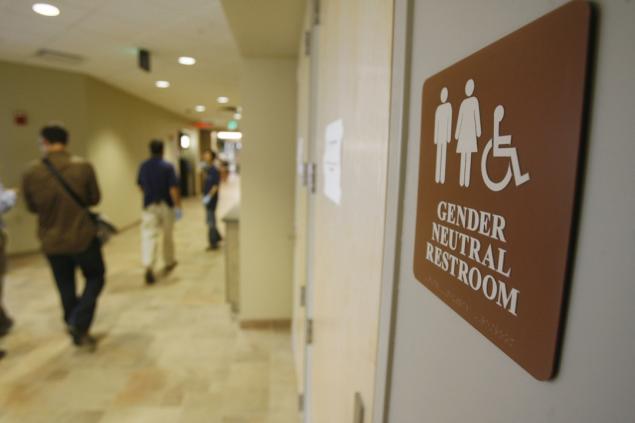Dear Dwonna:
You’re a big supporter and advocate of LBGT rights and equality. What did you think about Planet Fitness canceling the membership of the woman who complained about a transgendered woman using the woman’s locker room?
Signed,
Kayla
——————————————
Dear Kayla:
Yes—my friends and family and students know me as a big advocate of marriage equality and of LGBT civil rights, so my answer might come as a shock to many.
For those who have not heard, here’s the background to the story. In early March, Planet Fitness—a national gym whose mantra is that it is a “Judgment Free Zone”—canceled the membership of a woman who complained about a transgendered woman in the woman’s locker room.
Yvette Cormier, a 48-year-old member of the Midland, Michigan, Planet Fitness, said that she was “stunned and shocked” when “a person she thought was a man” (“he” was wearing leggings and a baggy t-shirt) entered the woman’s locker room while she was changing clothes. Cormier then complained to a front desk employee. “I wanted to know why there was a man in the woman’s locker room,” she told WNEM, a Saginaw TV station. “He looked like a man, and that’s what stopped me in my tracks.” The Planet Fitness employee told Cormier that it was “company policy to allow members to use whichever locker room associates with their gender identity.”
“They proceeded to tell me that they have to embrace whatever sex somebody thinks they are, and they’re allowed to use what restroom that they would want to use,” Cormier said. “They should point that out before you sign up to join their gym or post it on the front of the bathroom door.” The mother of two said that she was “acting out of concern for her safety and the privacy of other female gym members when she raised the issue on Saturday, February 28.”
Cormier returned to Planet Fitness on Monday, Tuesday, Wednesday, and Thursday “to get the word out” to other women that they “let men in the women’s locker room.” Cormier told CNN: “Every day I said, ‘just so you know, there’s a man they allow in this locker room and they don’t tell you that when you sign up.” Planet Fitness—perhaps fed up with Cormier’s unwillingness to drop the subject of this transwoman in the woman’s locker room—canceled her membership, saying that “the manner in which this member expressed her concerns about the policy exhibited behavior that management at the Midland club deemed inappropriate and disruptive to other members.”
Cormier said that she stands by her actions in a case that has drawn national attention to what rights transgender people have (or don’t have). “This is all new to me,” Cormier said. “I didn’t go out to specifically bash a transgender person that day. I was taken aback by the situation. This is about me and how I felt unsafe. I should feel safe in there.”
I suspect that my opinion to all of this will surprise a lot of people who know me and who know how vociferously active I have been in promoting the humanity and civil rights of the LGBTQI community, but I agree with the woman who complained about having to share a locker room with a transwoman. While I disagree with Cormier’s tactic of devoting four straight days to telling women who came to the gym that Planet Fitness allows transwomen to use the women’s locker room (that was quite obnoxious), I agree that every women should feel safe in a locker room that is supposed to be reserved for women only.
The issue is not that there are transgendered people in this society; of course, I believe that they should be treated with dignity and respect at all times and in all places. However, when it comes to sharing a public locker room where I am changing my clothes or taking a shower or using the restroom, I do not wish share this space with someone who is—biologically—a male and who, by all account, looks like a man. (It should be noted that Carlotta Sklodowska, the “man” involved in this case, has not taken hormones or had surgery to become a woman and that even he acknowledges that his “body structure is masculine.” “It’s obvious, even from the back,” Sklodowska said.) While I do believe that most people who present themselves to the world as transgendered really do believe that they were born in the wrong body, what is to prevent a man from saying that he’s transgendered just to gain entry into a woman’s locker room? I doubt that this would happen very often, but we live in a sick society where this is a very real possibility.
When I mentioned my opinion to a former male student who says that he’s a transwoman, he immediately accused me of being “transphobic” simply because I said that I did not feel comfortable sharing a locker room with a man who chooses to present himself to the world as a woman. He also told me that gender is fluid, that it is socially constructed, and that it is not defined by one’s genitals or sexual orientation. I disagree. There are, indeed, biological differences between men and women, and if gender is not “real,” then why do we even have men’s and women’s locker rooms at all? Why do we have men’s and women’s bathrooms? Where—and how—do we draw the line on how men and women should interact in public if gender is not “real” and is simply “socially constructed”?
The other thing that I think many transwomen fail to understand is what it means to be born and live in America as a woman. Although many transwomen have a plethora of stories about feeling alienated by the larger society because of their feelings of having been born “in the wrong body,” my life as a woman began at birth. As Shirley Chisholm said, “The emotional, sexual, and psychological stereotyping of females begins when the doctor says: it’s a girl.” Because many transwomen began and have lived a significant proportion of their lives as men, most of them have been accorded a certain unearned privilege that I as a woman have never received. Thus, they may not be aware of the fear that many women experience when they suddenly notice that a transwoman who looks like a man is standing next to them as they are changing their clothes in a locker room.
As a person who has only lived as a black woman, I know what it means to be vulnerable around men and especially around white men. I know what it means to be afraid to walk my dogs around my neighborhood before dusk and after dawn and to be told to “fuck off” when I ignore the man who’s whistling and hollering at me and trying to get my attention. I know what it means to fret about what I’m going to wear each and every day because I worry that a “provocative” outfit might lead some man to objectify me and/or my body. I know what it means to be extra vigilant when I’m home alone at night and hear a strange noise, and I fear for the day when Satchel Paige—my very protective lab/chow mutt—shuffles off this mortal coil and ascends to his place in doggy heaven because he makes me feel relatively safe in my house. Announcing that I prefer not to undress and shower in front of a man who says he’s a woman does not make me transphobic; it makes me a woman who lives in a society where women are often not safe around men. I, like a lot of women, live in a state of constant fear. Every. Damn. Day. I wish I didn’t, but I do.
When my trans-student asked me what my solution was because “transwomen are not men” and that “sending us to the men’s room would cause even more of a controversy,” I told him that the solution is very simple: have unisex bathrooms and ask those transwomen who “look like men” (or transmen who “look like women”) to use them. Although most transgendered people would prefer that everyone accept their new identity, it is neither fair nor reasonable for them to expect every woman to feel safe dressing and undressing in front of a transwoman who looks like a man. Transwomen should be more cognizant and more sensitive about how vulnerable this might make some women feel, and they should accommodate us even if they think we’re being capricious and thoughtless. This is not like the argument that some military folks made during the days of “Don’t Ask, Don’t Tell,” when straight men said that gay men would stare at them in the shower; this is about common sense and making sure that men and women have safe places to change their clothes, to use the bathroom, and to shower. This is not about keeping transwomen out of the gym or relegating them to lesser roles in society; it’s about giving all women some peace of mind.
I’ve talked just a little bit to my former male student who now lives part-time as a woman, and I must confess that I still don’t understand what it means to be transgendered. I am, nonetheless, open to learning and to hearing about his experiences. What does bother me, though, is that I cannot honestly ask him questions or tell him my opinion about having to share a locker room with someone like him without him calling me “transphobic” and then summarily dismissing what I believe are my very real concerns about sharing that space with a man. Why does his desire to live as a woman trump my desire to feel safe and comfortable?
Planet Fitness had every right to cancel Yvette Cormier’s membership. She was an obnoxious bully who didn’t behave well, and she deserved what happened to her. However, Yvette Cormier had every right to be concerned about Planet Fitness’s policy that allows every man who presents himself as a woman to use the woman’s locker room. The question then becomes: how do we help transgendered people feel safe in the ever-changing world while also making sure that all those they encounter feel safe and comfortable, too?
I am all for integrating transgendered people into mainstream society, but the reality is that we don’t live in that world yet. Establishments like Planet Fitness are a great beginning for helping society make that transition, but in the meantime, we must respect not only the feelings of the transgender community, but everyone else as well. So, the answer for now is simple—full disclosure. And unisex locker rooms. And just a little more time.

